Paying employees quickly and seamlessly is a big job. But with the right payroll services and software, today’s employers can do it quickly. What was once a payroll manager’s nightmare is now just a few clicks away.
There are even payroll service providers that offer fully automated payroll. So, you can pay all your employees quickly and seamlessly without lifting a finger.
In times of economic crisis, it’s important to be as efficient as possible, and payroll services help you automate tasks that used to be very labor-intensive.
From the best corporate services to simple payroll services for small businesses, there’s something for everyone who wants to get their paychecks today in 2023. You just need to know where to look.
If you’re tired of spending hours crunching numbers and comparing data ranges, it’s time to step into the 21st century and get reliable payroll software.
Here are the 10 best payroll services and software and their strengths.
Our Top 10 Best Payroll Services & Companies in 2023:
Gusto: The best all-in-one payroll service
ADP: Ideal for mid-sized businesses with powerful payroll services
Paychex: Ideal for small and medium-sized businesses looking for more than just payroll
Quickbooks Payroll: Ideal for payroll with a comprehensive general ledger
Paycor: Ideal for businesses looking for scalability
OnPay: Ideal for small businesses and self-employed accountants
Rippling: Ideal for auto-filling tax credits and processing payroll
Zenefits: Ideal for employee benefits
Square: Ideal for hourly workers, retailers, and small and medium-sized businesses
Dil. Ideal for international teams
Compare the Top 10 Payroll Services
A Closer Look at the Top 10 Business Payroll Services
1. Gusto
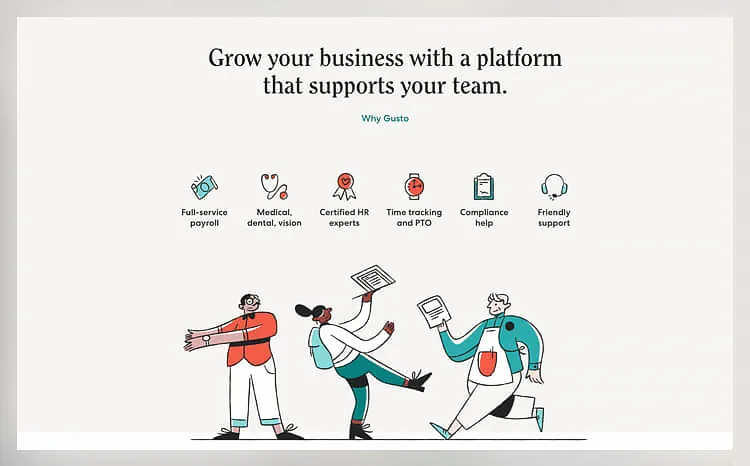
Gusto is one of the best payroll services for small businesses today, and it’s also a good option for freelancers and contractors. Offering automatic tax filing, a range of HR benefits like health, dental, vision, college funding, a 401k plan, and the ability to activate unlimited payroll accounts, Gusto is a cost-effective way for businesses to streamline their monthly invoices.
What’s more, Gusto integrates with a variety of other software, including accounting software like QuickBooks Online, Xero, and FreshBooks. You can also sync your time tracking software (like Time Tracker or Homebase) and expense management tools like Expensify to have a complete billing database.
PROS
- Convenient integrations
- Fully automates payroll and taxes.
- Also suitable for contractors and freelancers.
PROS
- Does not offer 24/7 customer support.
- Not all HR benefits are available in all states.
2. ADP
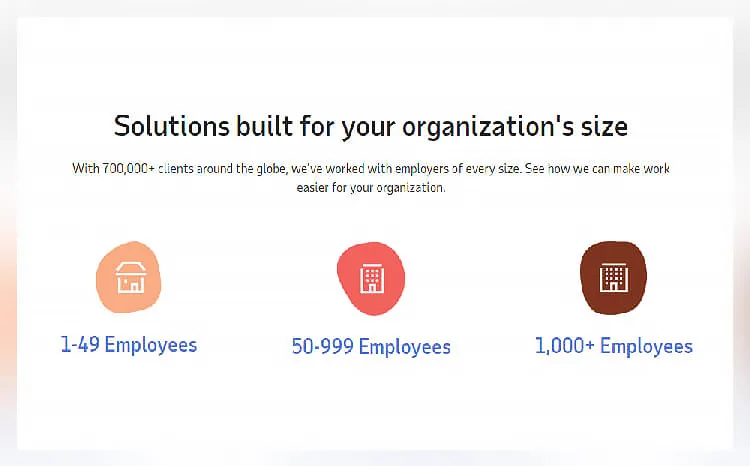
ADP is one of the oldest payroll services, both online and in person, which speaks to the experience of these professionals. Offering benefits and HR services, payroll, time and attendance management, ADP is a professional payroll service for companies looking for more than just software. From dedicated HR professionals and resource and service managers to full tax compliance, reporting, and self-service capabilities, ADP offers an impressive range of features and services.
ADP will automatically calculate tax liabilities, withhold and remit taxes on your behalf, and manage all reporting and filing, including W-2 and 1099 forms. What’s more, ADP is not limited to its local borders. This payroll service solves problems in more than 140 countries around the world.
PROS
- Excellent professional features and services
- Oldest Online Payroll Services
- Full-service, all-inclusive benefits and payroll
CONS
- Not as affordable as some competitors.
- No pricing plans for small businesses.
3. Paychex
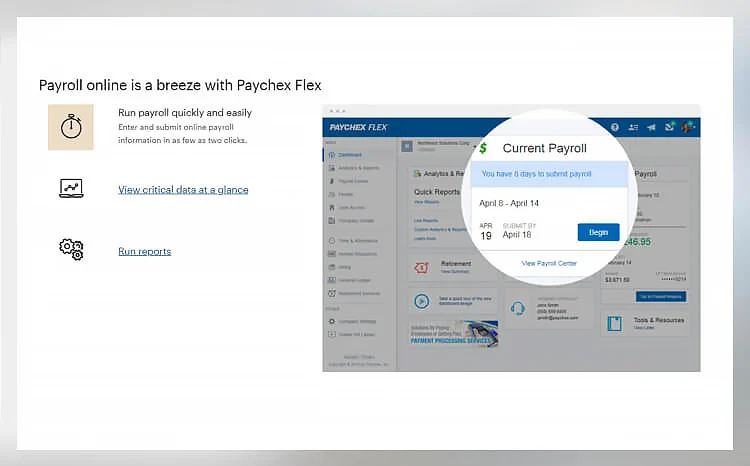
Paychex is a cloud-based payroll service provider with plans for businesses of all sizes, but is especially suited for small businesses with up to 50 employees. Paychex Flex, which is focused on small and medium-sized businesses, allows you to update your database via a desktop or mobile console, set up automated rules, and manage payroll quickly and efficiently. In essence, through self-service, Paychex relieves your employees of the burden of data entry.
In addition to payroll management, Paychex calculates, pays, and files all of your taxes, from local to federal. You can pay your employees via direct deposit, paper check, or credit card, whichever best suits your needs. Paychex plans include onboarding, HR analytics, and an event calendar for seamless invoicing.
PROS
- Easy-to-use software that anyone can use
- It’s a great option for small businesses.
- It’s scalable without sacrificing functionality
CONS
- Many reporting options can be confusing
- Requires familiarity with new version releases
4.QuickBooks
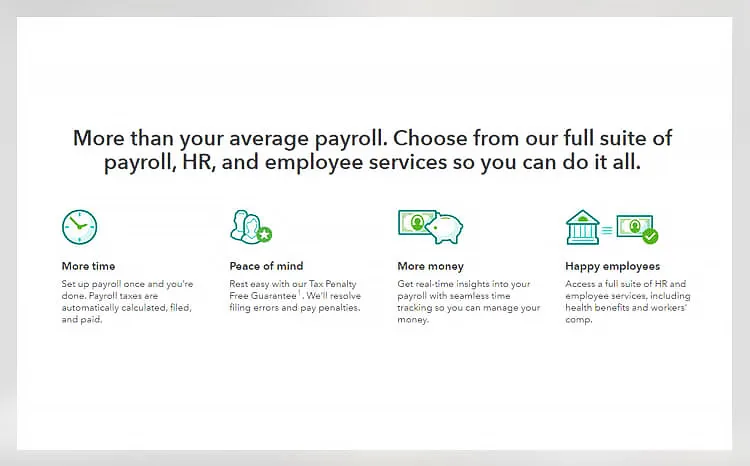
Intuit’s QuickBooks is another popular brand that has recently entered the payroll space. QuickBooks, the leading accounting software, now offers payroll services that seamlessly sync with all of your accounting software to provide a comprehensive service.
One of QuickBooks’ strengths is its tax reporting service. It’s one of the best payroll reporting services for managing your taxes throughout the year. QuickBooks automatically files all of your taxes, adjusts withholdings, lets you create custom tax categories, and tracks sales tax if you have an online store. It’s an elegant way to stay informed about one of the most important aspects of your business.
PROS
- Easy downloads
- Wide range of tax filing options
- Fully integrates with your accounting software
CONS
- Not as customizable as competitors
- Basic plans don’t include as many features
5. Paycor
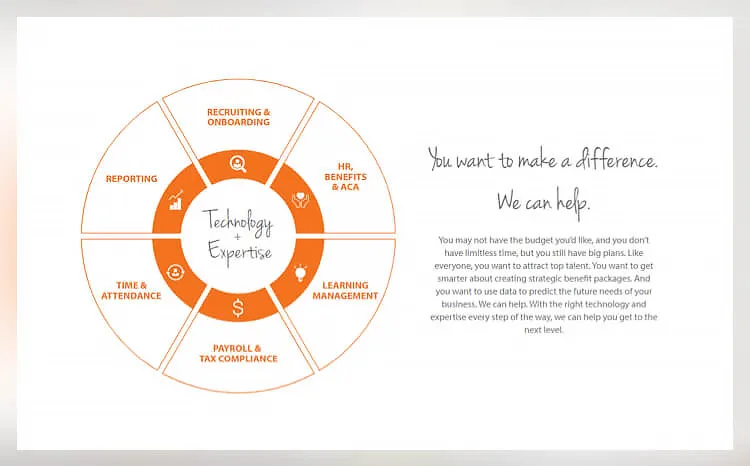
Paycor isn’t as well-known as big names like ADP and Gusto, but it’s still gained a large following. That’s because Paycor is a convenient, feature-rich payroll and HR management service that delivers on its promises. Paycor offers features like direct deposit, a convenient mobile app, an efficient payroll process, and customizable widgets, so you can do almost anything from within the app.
Another feature of Paycor that companies like is that it includes many of the more complex features offered by higher-priced payroll providers at a significantly lower price.
PROS
- Competitive pricing with a wide range of applications
- Extensive HR knowledge base
- Powerful reporting and analytics tools
CONS
- No online pricing information available
- Complicated employee evaluation process
6. Onpay
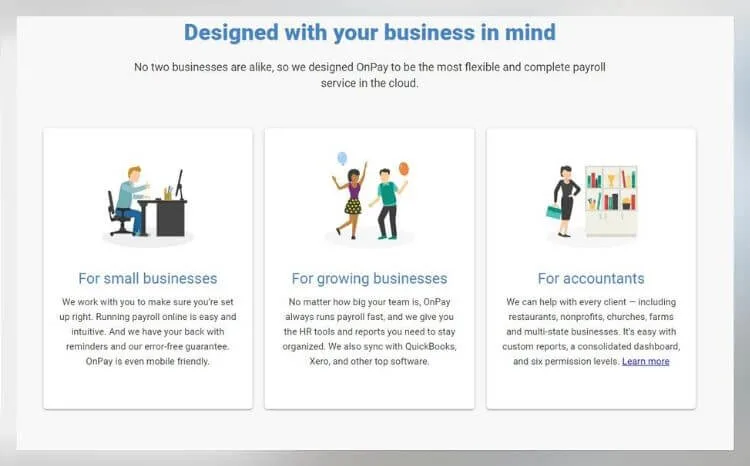
From its simple and easy-to-use interface to its unique pricing structure, Onpay offers an affordable and customizable payroll platform for small and growing businesses. While Onpay isn’t the most comprehensive product on the payroll market, it offers incredible depth and features that allow businesses to efficiently manage their payroll needs without much effort.
As a payroll service, Onpay has everything a small business needs covered. The platform helps you efficiently manage W2 employee and 1099 contractor payroll with automated tax reporting and payments, and manages payroll benefits including human resources, workers’ compensation, and insurance for all 50 states. Onpay also features impressive integration capabilities that allow you to integrate accounting and scheduling software that seamlessly syncs with the platform. Additionally, the customer service team is responsive and knowledgeable in answering questions quickly.
PROS
- Extremely affordable and easy to use
- Integrates with QuickBooks, time tracking software, and more
- Automatic tax reporting
CONS
- Not suitable for large businesses
- Limited to US-based companies
7. Rippling

Rippling’s payroll tool is a useful addition to your employee benefits management module, with which it fully integrates. While the tool only supports check payments and direct bank deposit, it allows you to quickly process payroll payments for companies with 1 or 1,000 employees in just 90 seconds with a single click.
PROS
- Integrates with HR component
- Pay in 90 seconds with a single click
- Automatic tax filing
CONS
- Only supports checks and bank payments
- Separate HR subscription
8. Zenefits
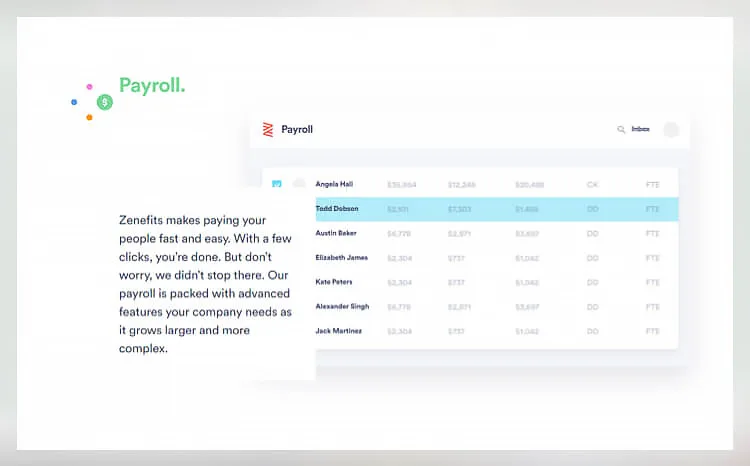
Zenefits is an easy-to-use payroll service that offers self-service for a simpler and faster user experience. And while its payroll services are excellent, Zenefits excels in the employee benefits department. You can get everything from medical, dental, and vision insurance to life and disability insurance, 401k retirement funds, FSA and HSA accounts, commuter benefits, and much more.
That’s not to say that Zenefits doesn’t offer quality online payroll services, because they do. Payroll is reliable and simple. Benefits include unlimited payments, withholdings, tip reporting, and contractor payments. You’ll also get dynamic mobile pay stubs through the easy-to-use app.
PROS
- Comprehensive employee benefits
- Easy-to-use self-service dashboard
- Powerful business intelligence reports
CONS
- Can’t do everything from the mobile app
- A bit of a steep learning curve
9. Square
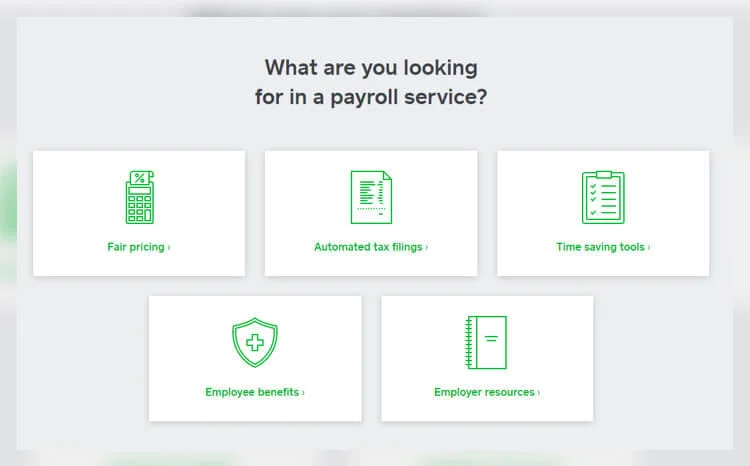
Square is one of the best small business services on the market, especially if you’re already using Square for your point-of-sale needs. Although one of the more expensive options, Square manages your entire payroll, includes common benefits like health insurance and a 401k plan, and has a variety of integrations.
Square fully automates your payroll and lets you manage unlimited monthly payrolls. You can track employee hours, import time cards and timesheets, and set and forget tax documents. Plus, Square is available across the United States. So no matter where you are, you can access these online payroll services.
PROS
- Fast and easy-to-use app
- Work multiple times a month
- Affordable and feature-rich
CONS
- Limited reporting
- Not all payment options supported
10. Deel
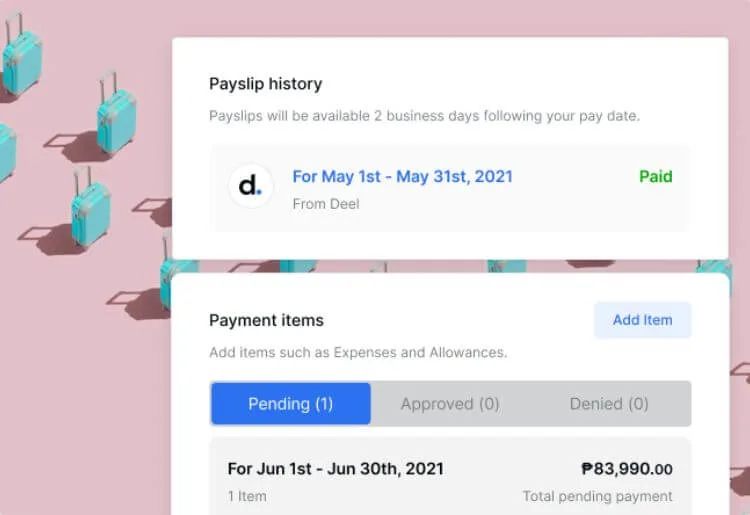
Deel is an excellent payroll and HR solution for international teams. You can use it as your team’s primary HR platform or integrate it with your existing HR software. Deel partners with over 200 law firms in 150 countries to ensure its platform is compliant with these regulations.
Deel automatically takes into account local taxes, pension contributions, and any other local regulations when paying your employees. For easy payment, consolidate all your employees’ salaries into one invoice in local currency. Plus, employees receive their pay in local currency. While it can be expensive for large companies, all of its features make Deel a must-have payroll and HR solution for international teams.
PROS
- Simple international payroll system
- Pay employees or contractors in 150 countries
- Multiple payment methods available
CONS
- Role-based permissions are somewhat limited
- Can be expensive for large companies
What Are Payroll Services and Software?

Paying salaries involves paying employees for their work. It typically involves processing payroll, withholding, and depositing money into employees’ bank accounts. Regardless of size, every business needs to maintain a payroll for its employees.
Payroll software and services perform the critical task of calculating and distributing employee wages, salaries, and benefits. This includes calculating gross pay, taxes, health insurance contributions, 401(k) plan contributions, and net pay. It also helps ensure compliance with federal, state, and local tax laws.
Payroll software can also help generate reports for audits and other purposes. The reports generated by payroll software allow a business to maintain accurate records of its finances and employee compensation information that are easily accessible from one place.
Types of Payroll Services
There are four types of payroll services: in-house payroll, payroll managed by an accountant or bookkeeper, payroll managed by an agency, and payroll managed by software.
- In-house payroll
In this case, the employer manages the payroll, which can be done manually or with online software. In-house payroll is suitable for businesses with a small number of employees, but it is not suitable for businesses with complex payroll needs or employees in multiple states. - An accountant or bookkeeper manages the payroll.
A certified public accountant (CPA) or a third party manages the company’s payroll through this option. This option is ideal for businesses that want to avoid the responsibility of managing their own payroll or for businesses with many employees and complex payroll requirements. It is also suitable for businesses with employees in multiple states. - Agency-Managed Payroll
Using a specialized agency to manage your payroll offers all the benefits of an accountant or CPA, plus a full team of experienced payroll professionals to manage your system. This leverages the existing expertise and is a good, albeit expensive, option for larger companies. - Managed Payroll Software
Payroll software is increasingly popular among small businesses due to its cost-effectiveness and ease of use. It is typically cloud-based and accessible from anywhere with an internet connection, making it ideal for companies with employees in multiple locations.
What Are the Stages of Payroll Processing?
Payroll processing involves several steps, from collecting employee information to filling out tax forms. Here’s a quick overview:
- Choose a pay cycle: Decide how often you will pay your employees.
- Data collection: Collect employee information, such as names and addresses, Social Security numbers, payroll information, and withholdings.
- Payroll: Use an online payroll program or a manual calculation to calculate each employee’s gross pay, withholdings, taxes, and net pay.
- Tax and Benefit Withholding: Calculate taxes and withhold benefits, if applicable.
- Payroll: Print checks, make online payments, or transfer funds directly to employees’ bank accounts.
- Submit reports and payments: Submit required reports to state and local agencies, as well as tax forms, Social Security/Medicare payments, and more.
- Reconcile accounts: This involves reconciling the payroll account with the company’s financial records to ensure the accuracy of all payments made during the payroll period.
How do You Process Payroll?
Payroll processing involves several steps: calculating wages, withholding taxes on behalf of the government, making payments, submitting the employer’s tax department to the appropriate state and federal agencies, and issuing W-2 forms to employees at the end of the year.
A company employee can do this manually, delegate it to others, or use a payroll platform.
- Process payroll manually.
This is often laborious and time-consuming, and is prone to errors. Invoices must be accurately recorded to avoid government penalties or fines.
- Outsourcing payroll processing
This option can be beneficial for companies looking for the convenience of online payroll processing and access to customer-facing staff who are experienced in managing complex issues. - Using a payroll platform for payroll processing
A payroll platform automatically calculates information based on employee data, such as hours worked and salary. Online platforms can also quickly generate payroll reports.
How Do Payroll Services Work?
A payroll service is an online platform that helps businesses manage their payroll needs. While several providers offer payroll services, most offer similar types of services.
These services typically handle the entire payroll process from start to finish through their software or website. Employers can use an online payroll software to calculate each employee’s gross pay, withholdings, and taxes.
This software can also help with withholding taxes and benefits from employee pay, pay workers’ compensation, file tax returns and payments online, and generate W2 forms for employees at the end of the year.
Online payroll services are great for businesses with employees in multiple states, as online service providers handle the complexities of tax administration, reporting, and payments across multiple states. An online software also makes it easy to access employee data from multiple locations.
Most services have a portal that allows employees to enter their information, such as their addresses, social security numbers, and bank account information. Some services also include online time clocks so employees can log their work hours.
In addition to the basic payroll process, some online payroll services may offer additional features, such as online contractor tracking and pension plan management.
Online services may also integrate with other online platforms, such as accounting packages or online human resources (HR) functions that manage employee training and benefits administration.
Payroll Software Management Features
Online payroll services offer several features that make it easy to manage your employee payroll. Features worth considering include:
- Accurate calculations
Accurate payroll calculations ensure that employees are paid correctly and that the business complies with state tax laws. - Automation
Most payroll software can automate administrative processes, such as calculating withholdings, submitting online reports and payments, and processing employee W-2 forms at the end of the year. - Paying taxes
Most programs will help you file your quarterly and annual taxes and make online payments to the tax authorities. - Compliance updates
Online payroll services often provide updates on changes in state and federal payroll tax laws. - Direct payments to employees
Look for a payroll software that allows employees to be paid via direct deposit to ensure they receive their paychecks on time and accurately. Customizable features
The customizable features of many payroll solutions allow employers to tailor their solutions to their specific needs. - Employee Portals
Online employee self-service portals can make it easy to upload, manage, and access timesheets online, reducing the time spent on human resources. - Security
A great online payroll service should offer secure data encryption to protect sensitive information from external threats. - Reporting and Analytics
Some platforms offer reports and analytics to track and manage payroll data, as well as measure overall productivity and performance. - Interface Integration
Many payroll services integrate with other online platforms, such as accounting packages. - Mobile Apps
Some online payroll services offer mobile-friendly interfaces so employees can access their information from anywhere, at any time.
How Much Do Payroll Services Cost?
The cost of online payroll services varies significantly depending on the brand and the number of features included. Most online payroll companies offer a variety of monthly plans so that businesses can choose the option that best suits their needs and budget.
Additionally, online business services typically have lower fees than traditional payroll providers, making them an attractive option for small business owners.
Prices can range from $20 to $300 per employee per month, depending on the features included. Businesses with more affordable plans can use the basic features of online payroll, although other services may be available for an additional fee. Full-service payroll solutions are more expensive.
Some systems include an additional fee for a “Global Registered Employer” package. Being a “registered employer” means that the online payroll provider is responsible for filing the necessary reports and documents to hire employees in international jurisdictions.
This is important for companies that need to manage payroll in multiple countries.
How Do You Use a Payroll Service?
The way you use the service will depend on the size of your team and the features the online platform offers.
The initial setup is straightforward for most providers, whether you have two employees or 200. You’ll need to create an account with an online payroll provider, then upload your employee information, including payroll deductions such as federal income tax, Social Security tax, and Medicare tax.
Payroll services are designed to automate much of the payroll process. Depending on the system you choose, this includes calculating employees’ salaries, making direct deposits to their bank accounts, and many other tasks.
The Difference Between a Payroll Software and a Payroll Service
At first glance, payroll software doesn’t look much different from the payroll services you’re used to. However, upon closer inspection, you will notice some significant differences that can make it easier to choose the type of payroll you want to invest in.
Below are some of the main areas where these two options differ.
Security
Perhaps the most important difference between payroll software and payroll services is security. Payroll services require you to send them all of your employee information in order to manage payroll. This includes highly sensitive data such as social security numbers, bank information, and records.
Of course, all of this is done over highly secure channels with the highest level of encryption. However, you are still sending sensitive data.
On the other hand, payroll software allows you to manage all of your payroll needs without sharing sensitive data with anyone. You store all of the information on your servers; only you can see these details. Therefore, this is undoubtedly the more secure option.
Convenience
Payroll companies have an advantage over payroll software in this regard. While it’s easy to get paid with online payroll services these days, it’s much easier to transfer all the information to someone else. Therefore, they’re a better option if you’re looking for payroll services without a phone.
Price.
Of course, price is one of the most important factors that many companies consider when comparing options. Payroll software definitely wins this battle.
This is because you can’t compare the pricing structure of the software to the pricing structure of the services. Therefore, if money is of the essence, payroll software will win.
The Benefits of Using a Payroll Service
Payroll used to be the nightmare of any manager or employer. Once a month (or maybe more often, depending on the company’s payroll structure), they had to face the daunting task of calculating, verifying, executing, and organizing the payroll of each and every employee.
This included vacation, sick leave, and holidays, as well as salaried, hourly, temporary, and contract employees. Everyone breathed a sigh of relief with the advent of payroll services and software.
The obvious benefit of using a payroll service is that it frees you from this time-consuming task. In addition, there are other benefits that a skilled business owner can gain from using a reliable service, such as:
- Eliminates Human Error
Businesses lose thousands of dollars every year due to incorrectly entered periods or forgotten zeros. When people are crunching numbers, mistakes can happen. When machines do the work, that margin for error is reduced to negligible or eliminated. - Tax Compliance
Most good payroll service providers also offer tax compliance and documentation as part of their packages. This includes calculation, filing, reporting, and other necessary tax requirements. This also means that you will be fully compliant, as these services are updated to meet the ever-evolving legal requirements of each state and company. - Keep Your Employees Informed
Payroll services store all important payroll data in one secure, easily accessible location for all employees. This way, your employees can quickly print their paychecks, review their annual payments, or add information as needed.
Other benefits include saving money through data reporting and business analytics, increasing time efficiency, and better human resource management, such as onboarding new employees, calculating vacation days, and managing benefits.
How to Choose the Right Payroll Service for You
While you can’t tell a company which plan is best for them, there are some key features to keep in mind when comparing prices.
Before you hire a service like a comprehensive payroll plan, make sure you meet the following requirements:
Comprehensive payroll management: Today, managing payroll requires just a few clicks.
- Simple payment methods: Whether you prefer direct deposit, credit cards, or business checks, make sure your payroll plan offers the options you need to pay your employees quickly and easily.
- Tax reporting: This is one of the most important benefits of using a payroll plan today. Make sure the payroll service providers you consider are compliant with all tax regulations, meaning they file all of your federal, state, and local taxes, are up-to-date with changes, and send out forms and files like W-2s and 1099s for all of your employees.
- Payroll management: Taxes aren’t the only thing you need to manage. Make sure your online payroll services handle workers’ compensation, bonuses, adjustments, and other legally required additional expenses.
- Human Resources Benefits Management: What benefits does your payroll service’s HR capabilities include? Does it include HR services? Will they cover medical care, such as dental or vision care? Do you offer additional benefits, such as physical and mental wellness packages? The more you can offer your employees, the happier and more productive they will be.
- Employee Self-Service: This isn’t an essential feature, but it is functional. Employee self-service means that your employees can submit information themselves. So you don’t have to waste valuable time entering all that data. It also means that your employees can access their information to print their paycheck or check how many vacation days they have left without you having to worry about searching for this data.
- Reports: Reports are an essential feature that allows you to gain valuable insight into the inner workings of your organization. From financial and budget summaries to employee information like productivity reviews, reports are an essential form of business intelligence that you won’t want to miss.
Why Payroll Services Are Crucial for Small Businesses
For small business owners, online services offer an efficient solution that saves time, money, and effort. Payroll tasks, such as calculating and filing taxes on time, can be time-consuming and require specialized knowledge. Payroll services allow business owners to focus on their core areas.
Online platforms are much more reliable and accurate than manual calculations, making it easier for businesses to comply with state and federal payroll tax laws.
Our Methodology: How We Rated Our Top Payroll Services
When writing our reviews, we thoroughly research each service provider. Our team visits their website to learn about the features the platform offers, how it differs from other payroll software, and its pricing.
We use demo versions of the software when they are available to assess usability. When they’re not available, we watch product videos and speak with vendors’ customer service teams to learn more about each software’s capabilities.
We also conduct a thorough peer review to compare payroll software platforms. This included reviewing the features and costs available from different vendors and identifying the unique capabilities of each platform.
Finally, our team conducts a thorough analysis of customer reviews to assess how businesses of all sizes use each service. We also review reviews from other vendors and reach out to each vendor’s customer service team to ensure we’re thoroughly covering all aspects of each program.
Other Payroll Services and Software We Reviewed
Can’t find what you’re looking for on this page? Here are other services and software we’ve reviewed so you can find one that fits your business needs.
- Dishonesty
- Payroll Insurance
- Roll by ADP
- Escort
- KPMG Spark:
- Patriot Software:
- Xero:
- It just works
The Bottom Line
Online payroll services are becoming increasingly popular among small businesses. They offer an efficient online method of management, saving companies time and money.
The company you choose should offer all the necessary features and be affordable for your business, so it’s important to do your research.




